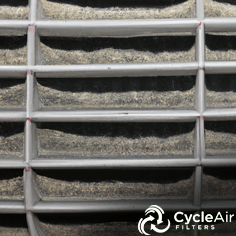
What Is a MERV Rating And Why Does It Matter?
| Scott C
MERV stands for Minimum Efficiency Reporting Value and it's a way of rating the effectiveness of furnace air filters in trapping particles of different sizes. MERV testing is standardized by the ASHRAE 52.2 test for residential HVAC filters. The higher the MERV rating, the more effective the filter is at trapping particles. MERV ratings range from 1 to 20, and when it comes to selecting the right air filter for your home, it's important to consider the specific needs of your home and the size of your HVAC system.
MERV 1-4: These filters have the lowest MERV rating and are usually only used for protecting the HVAC system. They won't do much for indoor air quality, but allow HVAC systems to run efficiently and still protect the blower fan from dust and debris - the primary function of the filter.
MERV 5-8: These filters are better at trapping larger particles like dust and pet dander. They are suitable for homes with pets, or for people with mild allergies. Most household needs are met within this range.
MERV 9-12: These filters are better at trapping smaller particles like mold spores. They are suitable people with asthma or other respiratory conditions.
MERV 13-16: These filters are considered high-efficiency filters, and are effective at trapping even smaller particles like bacteria and smoke. Filters in this range come at a cost to efficiency to airflow, and an HVAC system will work harder to pull air at this level. Hospitals usually use filters in this range with their industrial equipment.
MERV 17-20: These filters are considered the most efficient filters and are effective at trapping very small particles like viruses. They are typically used in commercial or industrial settings.
When selecting the right air filter for your home, it's important to consider the specific needs of your home and the size of your HVAC system. It's important to consult with a professional HVAC contractor to determine the right MERV rating for your home.
Additionally, you should keep in mind that some high-efficiency filters can also have a higher pressure drop, which means they can cause a greater restriction to airflow. This can lead to more wear and tear on your HVAC system, and can make it less efficient over time.
In conclusion, MERV ratings are a measure of how well a furnace air filter captures particles of different sizes, having the right MERV rating is essential for maintaining good indoor air quality and health, as well as making sure your HVAC system is working efficiently. However, it's also important to consider other factors, such as pressure drop, when choosing a filter to ensure the right balance is achieved. Speak to your HVAC technician if you're unsure what is right for your home's system.

Leave a comment
Your email address will not be published.